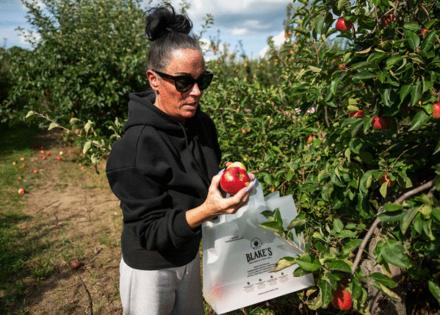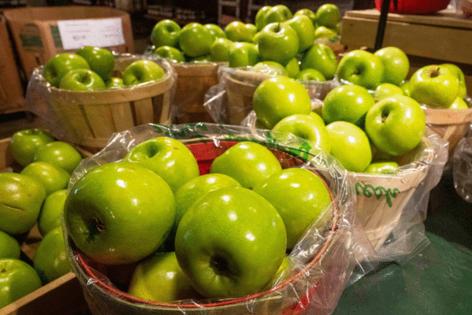Big apple forecast in Michigan has farmers squabbling
Published in Business News
ARMADA, Michigan — The forecast of a fourth straight lavish apple harvest in Michigan would normally put farmers in a celebratory mood.
But don’t serve the apple strudel just yet.
A Michigan farmers group is barking about a prediction by the U.S. Apple Association that the state will produce 30 million bushels of apples this year.
The Michigan Agricultural Cooperative Marketing Association argued the estimate is too high and its concern involves more than an academic discourse of horticulture.
Dawn Drake, association general manager, told the Michigan Farm News earlier this month that the rosy prognosis could hurt her members in the pocketbook. Growers will receive less money from processors who believe the harvest will be plentiful, she said.
That’s what happened last year when U.S. Apple projected a harvest of 30.5 million bushels, but the final tally was 27.3 million. It's the final supply that affects the prices for consumers.
“Their numbers are publicized immediately, all across the country, and customers everywhere see those numbers,” Drake told Michigan Farm News, a trade publication. “It really hurts us in the processing industry.”
Drake suggested U.S. Apple has a tendency to artificially pump up its forecast as a way to market the sale of apples to grocery stores.
The dispute comes as cider mill season started Saturday with the opening of cideries in Franklin and Goodison. Others opened earlier while Yates Cider Mill in Rochester Hill and Blake's Orchard and Cider Mill in Armada operate year-round.
Despite Drake's contention, a review of past forecasts by U.S. Apple found that it has been generally accurate, doing a better job than the U.S. Department of Agriculture in divining the size of harvests, according to research by The Detroit News.
Since 2007, the first year harvest sizes were listed on the USDA website, U.S. Apple significantly overestimated the yield four times, according to the Detroit News review. It underestimated the amount five times. The other years were generally accurate.
When contacted by The News, Drake declined to elaborate on her allegations.
U.S. Apple, a trade group based in McLean, Virginia, flatly denied putting its thumb on the scale.
Lynsee Gibbons, a spokesperson for the organization, said inflating the forecast would hurt growers, processors and shippers by preventing them from preparing for the harvest.
“We would never intentionally exaggerate a crop estimate,” Gibbons said. “We try not to be in the business of working against ourselves.”
Apple of their eyes
One thing the different groups can agree about is this: There will be a lot of apples in Michigan this year.
The USDA is predicting a harvest of 26 million bushels of apples. The Michigan Agricultural Cooperative Marketing Association pegged it at 25.5 million. The annual average is 21.7 million, according to the USDA.
U.S. Apple projected an even more bountiful yield in a report released last month at its annual meeting in Chicago.
The report, written by Chris Gerlach, U.S. Apple vice president of insights and analytics, said it reached the 30 million estimate by taking into account the USDA forecast and talking to farmers around Michigan about growing conditions in their orchards.
The weather has smiled on Michigan, according to the report. Spring brought some challenges with hailstorms and a late frost, but the latter wasn't as severe as four years ago and didn’t significantly damage the burgeoning fruit.
“Growers noted a few hail and frost events but didn’t expect that to significantly impact the crop,” Gerlach wrote.
The apple of discord over the U.S. Apple forecast seems to stem from competing differences between growers of apples sold to stores and those sold to processors.
The market in Michigan is split right down the middle, with 51% of apples going to stores and the rest to processing plants, according to the USDA.
Michigan's most valuable fruit crop
If fall in Michigan could be symbolized by an object, it would be round, crunchy and juicy.
Michiganians flock to apple orchards and cider mills, returning home with gallon jugs and doughnut-infused sugar highs.
Pumpkins, eat your hearts out.
While Washington state is the top apple-growing state, Michigan constantly vies with New York for the second slot.
Within Michigan, apples are the king of the cornucopia. They make more money than all other fruits combined. Their $322 million annually dwarfs the next two biggest: blueberries ($148 million) and tart cherries ($32 million).
“Apples are the largest and most valuable fruit crop in our state,” said Diane Smith, executive director of Michigan Apple Committee, a Lansing-based trade group. “Apple crop sizes will increase, and we’ll continue to see these larger crops.”
Blake’s Orchard & Cider Mill, one of the premier apple-picking farms in Michigan, said the fruit is already prime for plucking and will be so through October.
Kelly Duncan, Blake’s marketing vice president, said the fulsome harvest will allow the Armada orchard to offer its popular cider, which is a blend of five varieties of apples.
“The apple crop is the cornerstone of a great fall season,” Duncan said. “We’re excited to share it with our customers.”
A bumper crop of challenges
Besides concerns at processing plants, apple growers are facing other challenges.
The demand for the crop was flat in the U.S. last year and exports dropped, according to U.S. Apple. While prices were low, costs continued to grow for fuel, fertilizer and labor.
Growers are trying to counter the rising expense by embracing growing practices such as planting higher-density orchards and using improved technology to monitor the weather and soil health, said U.S. Apple.
“It’s been a challenging few years for apple growers,” said Gibbons, the U.S. Apple spokesperson.
As for any lingering agitation by the Michigan Agricultural Cooperative Marketing Association, Gibbons extended an olive branch. If the Michigan group wanted to participate in the next harvest forecast, it is welcome to attend U.S. Apple’s annual confab in Chicago next year, she said.
©2025 www.detroitnews.com. Visit at detroitnews.com. Distributed by Tribune Content Agency, LLC.















Comments